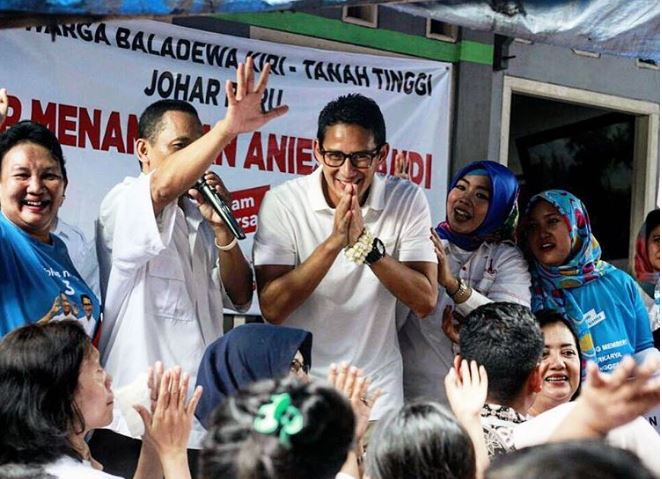Yesterday’s announcement that Gerindra chairman Prabowo Subianto had named Jakarta Vice Governor Sandiaga Uno as his running mate in the 2019 presidential election was already surprising, but it was downright shocking given that Sandiaga had been accused of paying two political parties IDR500 billion (US$35 million) each to receive the #2 spot on Prabowo’s ticket.
Democratic Party deputy secretary general Andi Arief set off a political firestorm on Wednesday night by publicly accusing Sandiaga of making the payments to long time Gerindra supporters PAN and PKS. Officials from both parties fiercely denied the accusation but did say they agreed to support Sandiaga as Prabowo’s running mate when Prabowo made the announcement last night.
Despite the denials, Andi did not back down from his accusation and even claimed to have data to support it. However, it’s unclear whether Andi will continue to press the matter given that the Democrats were forced to declare their support for Prabowo’s ticket today (due to a legal requirement forcing all parties to choose a presidential candidate to support).
But now that the accusation is out there, it’s unlikely to simply disappear. And if indeed there is hard evidence that Sandiaga paid the enormous sums to PAN and PKS in order to secure his nomination, then that would mean he, as well as the political parties that allegedly accepted his money, would be in violation of the country’s election law and at risk of facing some seriously negative repercussions.
The practice of cadres having to pay their parties enormous “dowries” in order to receive nominations and cover the costs of their campaign is extremely pervasive in the world of Indonesian politics. On top of their basic corruption of the democratic process, in many cases candidates end up of having to finance the dowries by making crooked money-making deals once they’re in office.
Despite their ubiquity, such payments are officially illegal under Indonesian election law. For that reason, a representative of the Elections Advisory Agency (Bawaslu) said they were ready to investigate the claims about Sandiaga’s alleged IDR 1 trillion dowry.
“Yes (we will investigate), because according to Article 228 of Election Law No. 7 of 2017, candidate pairs are prohibited from giving money or rewards to political parties in order to become presidential candidates,” Bawaslu member Fritz Edward Siregar said yesterday at the offices of the General Election Commission (KPU) in Jakarta as quoted by Detik.
Fritz said that a candidate who had been proven to give such a payment could face serious sanctions, the biggest one being KPU canceling the candidate’s entire ticket. On top of that, parties found to have engaged in the practice could also face severe sanctions, the worst being that they would be barred from fielding a candidate in the following election.
However, Fritz said that any such cancellation would ultimately only take place after a thorough investigation as well as a court decision ordering the candidacy to be canceled (something which has never happened to a presidential or vice presidential candidate previously).
Many are skeptical that Bawaslu or any other government agency will seriously look investigate the allegation, given how powerful players at the center of it. But Bawaslu had also previously promised to seriously crack down on the practice of political dowries, particularly earlier this year before the regional elections. If they want to show they are truly serious about fighting the culture of corrupt money politics in Indonesia, then they have to take the accusation against Sandiaga seriously.




